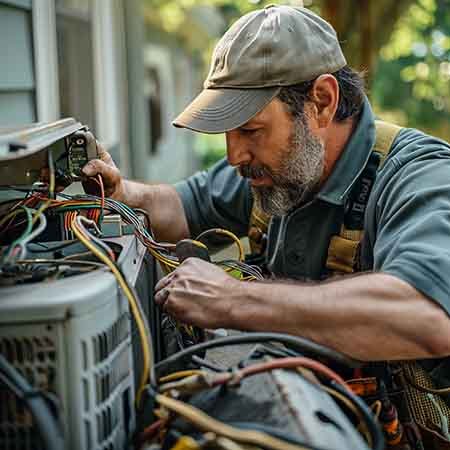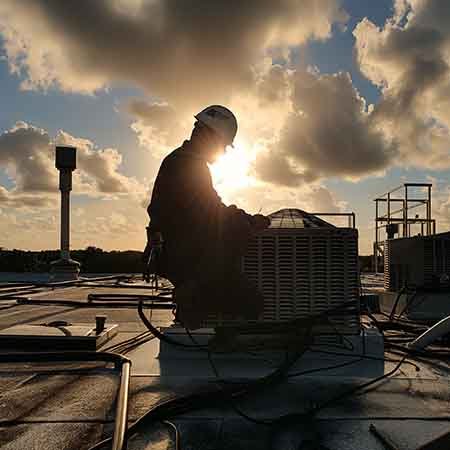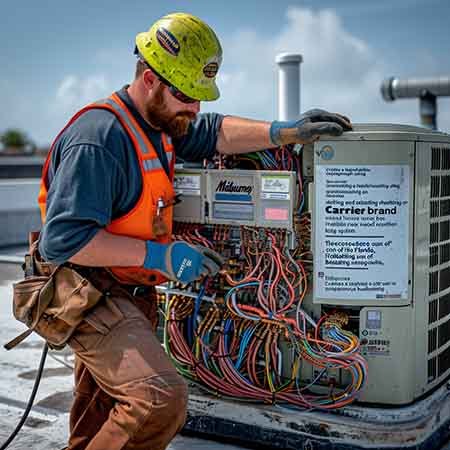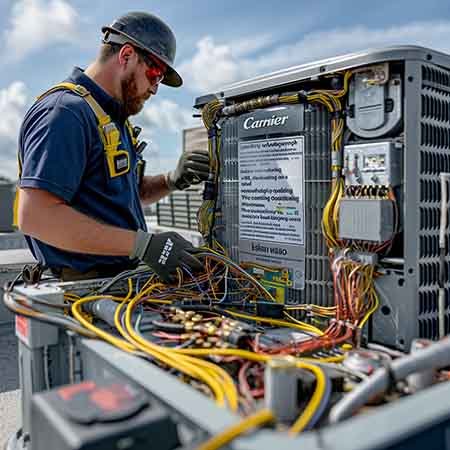Introduction to Air Conditioning: Understanding the basics of air conditioning, including types of systems and their applications.
AC System Components: Detailed study of components like compressors, condensers, evaporators, and expansion devices in AC systems.
Air Conditioning Refrigerants: Exploring various refrigerants used in AC systems, focusing on characteristics and environmental impacts.
AC Electrical Systems: In-depth look at electrical components in AC systems, including motors, capacitors, and control circuits.
Psychrometrics in Air Conditioning: Studying the properties of air-vapor mixtures and their importance in air conditioning processes.
Load Calculation and System Sizing: Techniques for accurately calculating cooling loads and determining appropriate system sizing.
Duct Design and Air Distribution: Principles of ductwork design, sizing, and ensuring effective air distribution.
AC System Installation: Best practices for the installation of various types of air conditioning systems.
Thermostats and Control Systems: Understanding and working with different types of thermostats and modern control systems.
Indoor Air Quality (IAQ) in AC Systems: Addressing IAQ concerns, including ventilation, filtration, and humidity control.
Energy Conservation in Air Conditioning: Strategies and techniques for enhancing energy efficiency in AC systems.
Air Conditioning Maintenance: Comprehensive guidance on routine and preventative maintenance practices.
Troubleshooting AC Problems: Systematic approaches to diagnosing and resolving common AC issues.
Repair Techniques for AC Systems: Advanced repair methods and best practices for fixing AC systems.
Safety Protocols in AC Work: Emphasizing safety standards and protocols specific to air conditioning work.
Sustainable AC Practices: Exploring eco-friendly practices and green technologies in air conditioning.
Building Automation Systems: Introduction to building automation and its integration with AC systems.
Heat Pumps and Their Functionality: Detailed look at heat pump systems, including operation and maintenance.
Variable Refrigerant Flow (VRF) Systems: Understanding the operation and advantages of VRF systems in air conditioning.
Chilled Water Systems: Examining the design and operation of chilled water systems used in larger buildings.
AC System Retrofitting: Processes and considerations for retrofitting and upgrading existing AC systems.
Customer Service in AC Maintenance: Developing effective communication and customer service skills for AC technicians.
AC System Diagnostics: Using advanced diagnostic tools and techniques for AC system analysis.
Noise Control in AC Systems: Identifying and addressing noise issues in air conditioning units.
Environmental Regulations and Compliance: Overview of environmental regulations impacting AC systems, including refrigerant handling.
Commercial and Industrial AC Systems: Differences between residential and larger-scale commercial/industrial systems.
Smart AC Technologies: Exploring advancements in smart technology for air conditioning, including IoT integration.
AC System Efficiency Analysis: Techniques for evaluating and enhancing the efficiency of air conditioning systems.
Emergency AC Services and Protocols: Training for handling emergency service calls and urgent AC issues.
Professional Development in the AC Industry: Focusing on career advancement and staying updated with industry trends.




